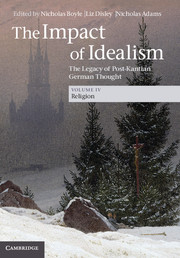Book contents
- Frontmatter
- Contents
- List of Contributors
- Acknowledgements
- List of Abbreviations
- Introduction: the impact of Idealism on religion
- 1 The impact of Idealism on Christology: from Hegel to Tillich
- 2 German Idealism's Trinitarian legacy: the nineteenth century
- 3 German Idealism's Trinitarian legacy: the twentieth century
- 4 Kierkegaard, Hegelianism and the theology of the paradox
- 5 Biblical hermeneutics: from Kant to Gadamer
- 6 Aesthetic Idealism and its relation to theological formation: reception and critique
- 7 The autonomy of theology and the impact of Idealism: from Hegel to radical orthodoxy
- 8 Faith and reason
- 9 Rabbinic Idealism and Kabbalistic realism: Jewish dimensions of Idealism and Idealist dimensions of Judaism
- 10 ‘In the arms of gods’: Schelling, Hegel and the problem of mythology
- 11 Dialectic and analogy: a theological legacy
- Bibliography
- Index
- References
Introduction: the impact of Idealism on religion
Published online by Cambridge University Press: 05 December 2013
- Frontmatter
- Contents
- List of Contributors
- Acknowledgements
- List of Abbreviations
- Introduction: the impact of Idealism on religion
- 1 The impact of Idealism on Christology: from Hegel to Tillich
- 2 German Idealism's Trinitarian legacy: the nineteenth century
- 3 German Idealism's Trinitarian legacy: the twentieth century
- 4 Kierkegaard, Hegelianism and the theology of the paradox
- 5 Biblical hermeneutics: from Kant to Gadamer
- 6 Aesthetic Idealism and its relation to theological formation: reception and critique
- 7 The autonomy of theology and the impact of Idealism: from Hegel to radical orthodoxy
- 8 Faith and reason
- 9 Rabbinic Idealism and Kabbalistic realism: Jewish dimensions of Idealism and Idealist dimensions of Judaism
- 10 ‘In the arms of gods’: Schelling, Hegel and the problem of mythology
- 11 Dialectic and analogy: a theological legacy
- Bibliography
- Index
- References
Summary
There are three headings under which we might consider the impact of Idealism on religion. The first concerns those areas of intellectual enquiry where the impact of Idealism is well understood in general, even if the particularities are not often in view. The second concerns those areas where the patterns of thinking are familiar, but their debts to Idealism are less often noticed. The third concerns those developments that display the impact of Idealism but are much less familiar.
The first strand, where the impact of Idealism is familiar, includes the doctrines of Christology and of the Trinity, in particular, and the transmission of idealist thought through various major theological figures in the nineteenth and twentieth centuries. The second strand, where the patterns of thinking are familiar but the debts to Idealism are less often noticed, includes developments in hermeneutics, in the relation between unity and plurality, in radical orthodoxy and non-realist theology, and in the conflict between faith and reason. These are familiar topics in theology and are central to a variety of intellectual strategies in contemporary thought. The impact of Idealism on their development and modes of expression is less often remarked; essays in this section lay special emphasis on this impact. The third strand, where the impact of Idealism is obvious when one investigates certain topics but the topics themselves are less familiar, includes the development of themes in Jewish philosophy, the rise of the category of ‘myth’ and some aspects of theology in the twentieth century.
- Type
- Chapter
- Information
- The Impact of IdealismThe Legacy of Post-Kantian German Thought, pp. 1 - 23Publisher: Cambridge University PressPrint publication year: 2013
References
- 2
- Cited by

